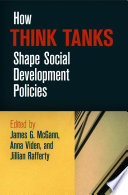Product desciption
How Think Tanks Shape Social Development Policies James G Mcgann by James G. Mcgann, Anna Viden, Jillian Rafferty 9780812246018, 0812246012 instant download after payment.
Across the globe, there are more than four thousand policy institutes, or think tanks, that research or advocate for economic and social development. Yet the relationship between these organizations and the policies they influence is not well understood. How Think Tanks Shape Social Development Policies examines case studies drawn from a range of political and economic systems worldwide to provide a detailed understanding of how think tanks can have an impact on issues such as education policy, infrastructure, environment and sustainable development, economic reform, poverty alleviation, agricultural and land development, and social policy. Each chapter provides an overview of the approaches and organizational structures of specific think tanks, as well as the political, economic, and social opportunities and the challenges of the environments in which they operate. The contributors study the stages of innovative think-tank-aided strategies implemented in highly industrialized world powers like the United States and Russia, emerging countries such as China, India, Brazil, and South Korea, and developing nations that include Ethiopia, Kenya, and Tanzania. Accompanied by an extensive introduction to contextualize the history and theory of policy institutes, this comprehensive comparison of policy success stories will be instructive and transferable to other think tanks around the globe. Contributors: Assefa Admassie, Celso Castro, Kristina Costa, Francisco Cravioto, Marek Dabrowski, Matt Dann, He Fan, Rajeev Gowda, Oh-Seok Hyun, Christian Koch, Jitinder Kohli, R. Andreas Kraemer, Elena Lazarou, William Lyakurwa, Ashwin Mahesh, Florencia Mezzadra, Partha Mukhopadhyay, Mcebisi Ndletyana, Sridhar Pabbisetty, Miguel Pulido, Marco Aurelio Ruediger, María Belén Sánchez, Dmitri Trenin, Samuel Wangwe, Vanesa Weyrauch, Maria Monica Wihardja, Rebecca Winthrop, Wang Xiaoyi.


